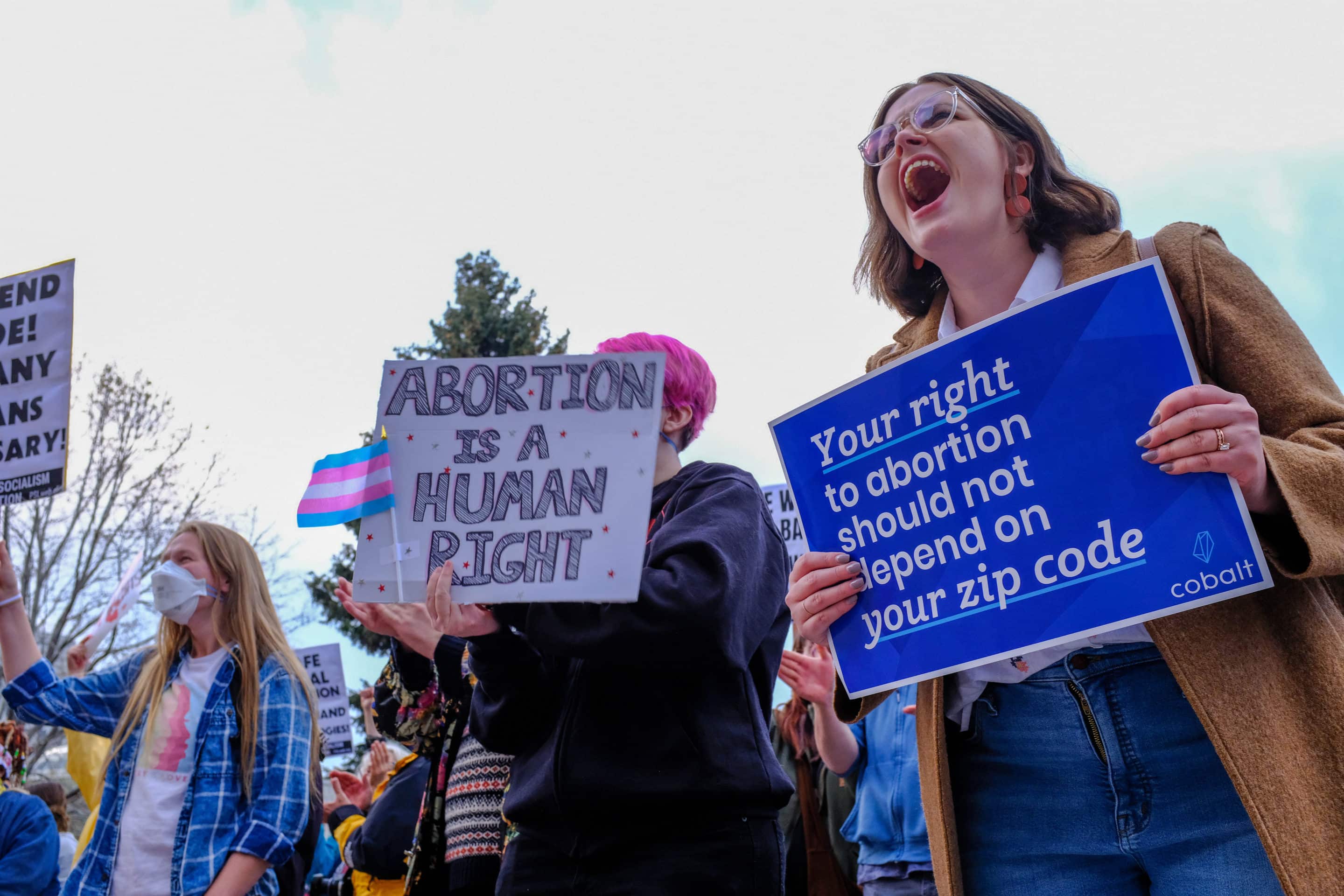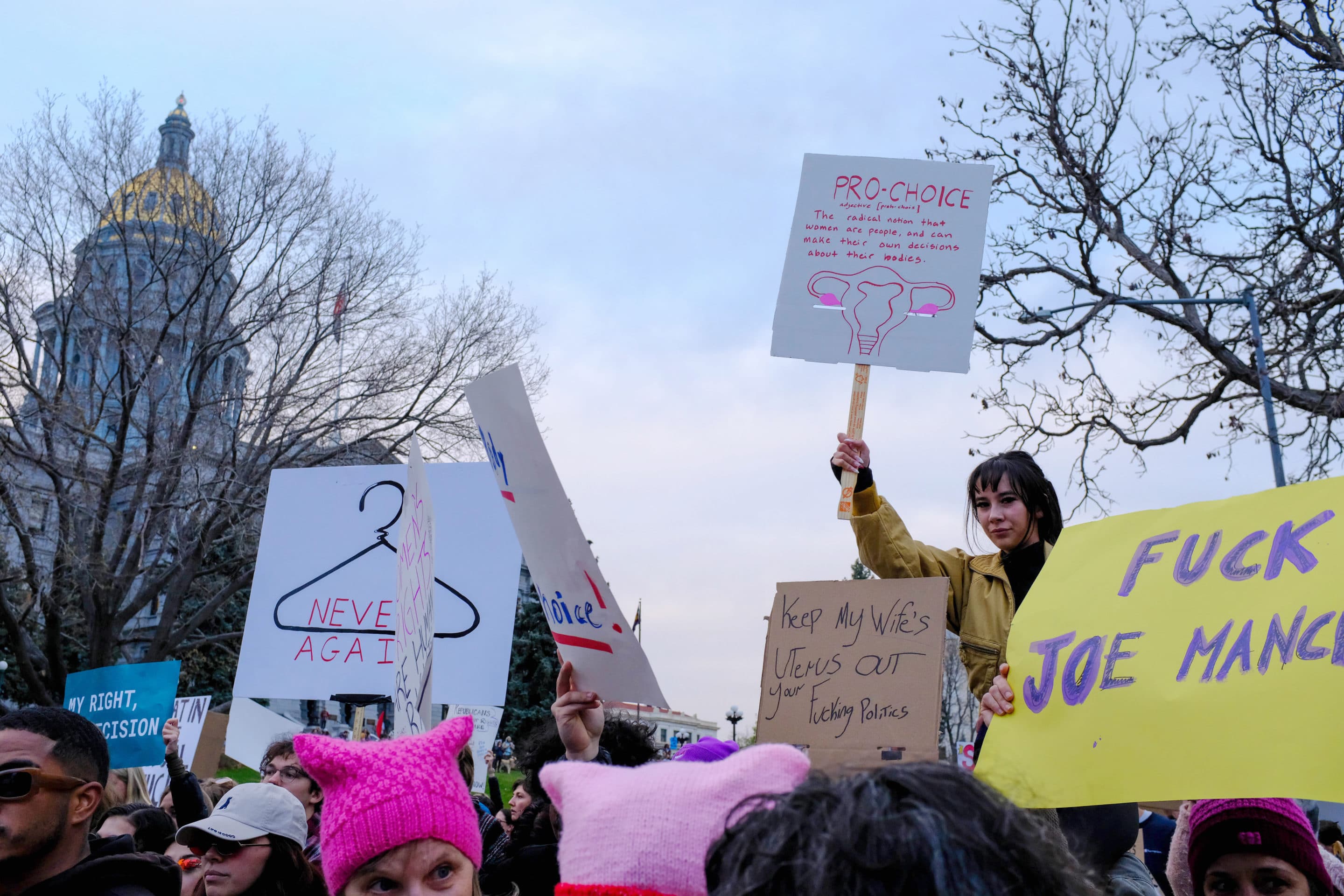//A woman wearing a mask with a Ruth Bader Ginsberg quote at the Women’s March in Washington, D.C. Oct. 17. Photo from Shutterstock.
Earlier this month, thousands of protestors at the Women’s March in Washington D.C. wore masks and t-shirts emblazoned with a famous quote from the late Justice Ruth Bader Ginsburg, “Fight for the things you care about but do it in a way that will lead others to join you.” They marched to show their aversion over the nomination of Judge Amy Coney Barrett to the U.S. Supreme Court.
Ginsburg, an associate Justice of the Supreme Court and tireless advocate for equality, spent much of her life fighting to protect women’s reproductive rights, including the right to an abortion. She believed abortion restrictions were a form of sex discrimination. Nearly 30 years ago, Ginsburg said, “The decision whether or not to bear a child is central to a woman’s life, to her well-being and dignity. When the government controls that decision for her, she is being treated as less than a fully adult human responsible for her own choices.”
And now, following the 87-year-old’s death on Sept. 18, organizations across the country are putting out an urgent call. The ACLU of Colorado released a statement stating, “With Justice Ginsburg now gone, it falls on all of us to honor her legacy by continuing that fight.”
After only a week of hearings this month, lawmakers voted 52-48 on Monday to confirm Judge Amy Coney Barrett. Not a single Democrat supported her confirmation—the first time since the mid-1800s that a Supreme Court nominee has not received any votes from the opposing party.
Barrett’s confirmation puts the future abortion cases in the hands of a Supreme Court now cemented with a 6-3 conservative majority.
The confirmation of Barrett—the highest court’s youngest judge at 48 years old, devout Catholic and mother of seven—further fulfills a promise made by the president, to pack the courts with pro-life justices, potentially paralyzing Roe v. Wade, a Supreme Court precedent since 1973 that solidified a woman’s constitutional right to an abortion.
In a statement, Students for Life of America celebrated Barrett’s confirmation, calling her a brilliant jurist who will bring a fresh perspective to the law and one who will protect life in the law.
Women’s rights organizations condemned the move.
“This confirmation unequivocally alters the balance of our nation’s highest court against abortion rights and access,” said Andrea Miller, president of the National Institute for Reproductive Health.
Now, Barrett’s track record on abortion will be tested with a case out of Mississippi, just days after her swearing-in ceremony. The petition, filed by the state’s first female attorney general, marks the start of more than a dozen abortion-related cases seeking a Supreme Court decision.
Despite the increasing number of abortion cases making their way through the courts, public opinion surrounding abortion has shifted. In a 2019 survey, about 61% of respondents said that abortion should be legal in all or most cases, compared with 38% who said it should be illegal all or most of the time, according to the Pew Research Center.
Mississippi’s Gestational Age Act focuses on “preserving the right to life after 15 weeks within the womb.” Two years ago, the legislation was struck down by a federal district court, failing to take effect. Lynn Fitch, the state’s Republican attorney general and outspoken supporter of Barrett’s confirmation would like to see it reversed, saying she hopes the Court will accept the case and allow Mississippi to defend innocent life.
“This new filing by Mississippi’s Attorney General makes clear the threat to Roe v. Wade is real and imminent,” said Adrienne Kimmell of Cobalt, a national pro-choice organization.
Barrett’s past could shed light on how she will vote Monday when at least four Supreme Court justices are needed to take up the petition by Fitch. The Center for Responsive Politics reports Barrett signed an ad in 2006 calling the 1973 Roe v. Wade landmark decision “barbaric” and a “raw exercise of judicial power.”
During Barrett’s Senate confirmation hearings, she was much less forthright. When asked about her views on abortion by various female U.S. Senators, she failed to commit to an answer saying she wasn’t “going in with some agenda.”
In a recent CBS News interview with 60 minutes, Trump emphasized, “If [Roe v. Wade] ever were overturned, it would go back to the states.” He went on to say that if that happens, women would potentially need to go to another state to seek an abortion.
Today, there are roughly 1,200 state laws aimed at restricting access to abortion, with 42 abortion restrictions enacted between January and May of last year alone. This is In part why women from more than 30 states have traveled to Colorado for abortions, according to data collected by the Colorado Department of Public Health and Environment.
The Guttmacher Institute found Colorado is one of a handful of states with few restrictions surrounding abortion. As of Sept. 1, abortion cannot be covered by insurance for public employees and parental notification of a minor before an abortion must be provided. But an additional restriction may be added after the Nov. 3 election. Proposition 115 is on Colorado’s ballot, which would make it a crime for doctors to provide abortion care starting at 22 weeks in pregnancy.
“Proposition 115 is a one-size-fits-all mandate that fails to acknowledge every pregnancy is unique and shows no compassion for what families face in unimaginably complicated circumstances,” the ACLU of Colorado said in a statement.
Proponents of Proposition 115, like Respect Life Denver, promotes on its website that it isn’t about politics—it’s a matter of right and wrong. They add that a baby in the womb at 22 weeks is a living, feeling human being.
Prop 115 marks the ninth measure relating to abortion to appear on a Colorado ballot since 1984, but the first to address gestational age.





0 Comments